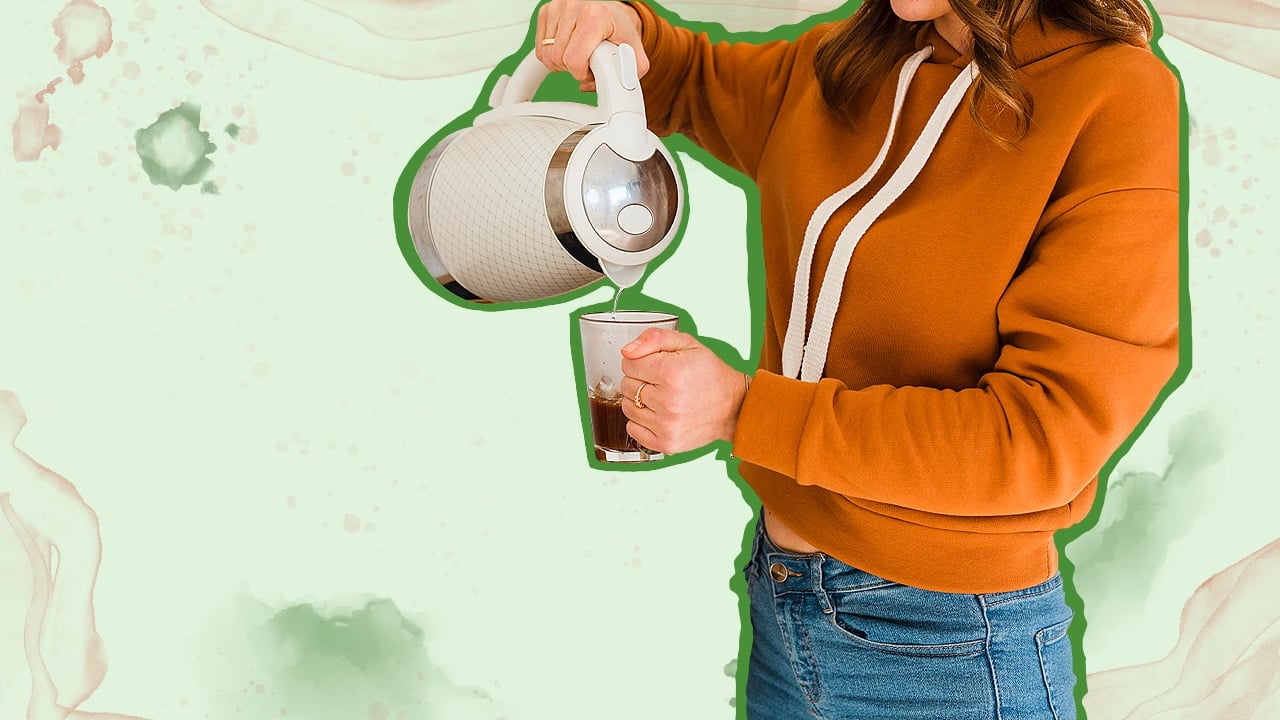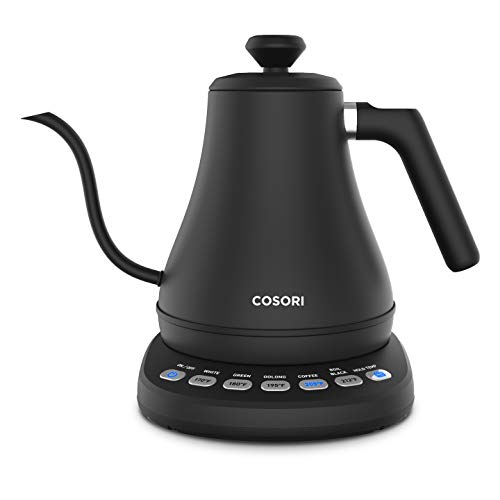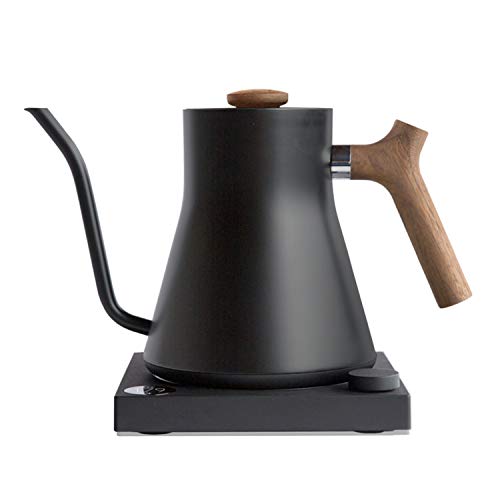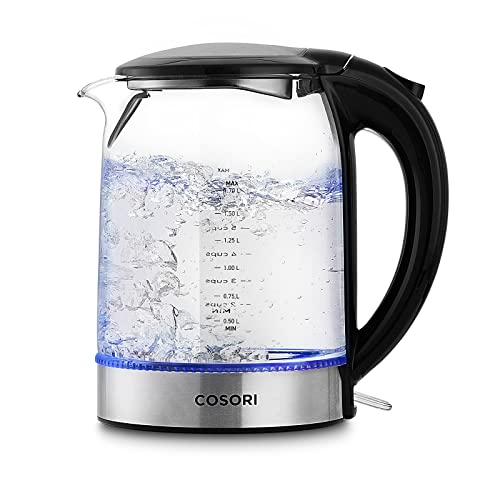9 Best Plastic Free Kettles On The Market In 2023: A Guide
Coffee and tea drinkers hold tea kettles in high regard as an essential appliance! What most aren’t aware of are the hazards most tea kettles possess. Chemically-treated kettles, like those made of plastic, can pose significant health risks to you and your family. Fortunately, there are alternatives you can check out. Let’s look at the […]

9 Best Plastic Free Kettles: Healthy Options for a Healthy Family
A tea kettle is a staple appliance in any household. Not only do you need boiling water for beverages like hot chocolate, but they’re also used for cooking up instant noodles, oatmeal, and other foods. Although convenient, many kettles contain harmful materials that can negatively affect health. Below are the best non-toxic tea kettles you can switch to in 2023:1. ASCOT Stainless Steel Electric Tea Kettle – Best Overall
- ☕ UNIQUE DESIGNED CRAFTSMANSHIP - ASCOT matte silver...
- ☕ 100% STAINLESS STEEL - Made of food-grade 304 stainless...
- Sleek, minimalist design
- Efficient heating
- Large capacity
- No custom temperature settings
- Not dishwasher safe
2. COSORI Gooseneck Electric Kettle – Best Value for Money
- 5 One-Touch Presets: Your Gooseneck Electric Kettle features...
- 1 Hour Keep Warm: Use the HOLD TEMP function to keep the...
- Easy temperature control
- Stays hot
- Great value
- Not dishwasher safe
- Black finish collects fingerprints easily
3. Quickone Takei Whistle Kettle – Best Budget Option
- Country of origin: Japan/Tsubame
- Ih induction heating cooker 2v/1v correspondence,...
- Excellent craftsmanship
- Easy to use
- Large capacity
- Instructions are in Japanese
- Limited product details online
4. Alessi 18/10 Stainless Steel Kettle – Most Stylish
- Designer: Michael Graves
- In PA, 18/10 stainless steel
- Unique design
- Rust-proof body
- Accurate spout angle
- The whistle is too quiet
5. OXO BREW Classic Tea Kettle – Most Classic
- Easy-open, one-touch spout cap
- Soft, angled handle for comfortable pouring
- Easy to use
- Loud whistle
- Highly-rated
- May rust
6. Fellow Stagg Electric Gooseneck Kettle – Best Pour-over
- STAGG EKG ELECTRIC KETTLE: Simple aesthetic meets powerful...
- PRECISION POUR: Stagg EKG's sleek pointed spout is designed...
- Customizable brew settings
- Advanced heating base
- Sleek design
- No sounds when the water reaches the target temp
- Slow pouring
7. Willow & Everett Gooseneck Electric Kettle – Best User-Friendly
- CUSTOMIZE W/ PRESET TEMPERATURES: Tired of that burned...
- QUICK & ATTENTION-FREE BOILING: 1000 watt, 120-volt electric...
- Easy-to-follow controls
- Boils water fast
- Temperature settings may not match different altitudes
8. Tealyra Glass Stove-top Kettle – Best for Tea
- STOVE-TOP SAFE - 60oz / 1800ml - Borosilicate glass tea...
- Can be used to both prepare and serve hot or cold beverages
- Minimalist design
- Large capacity
- Serves both hot and cold drinks
- Dishwasher safe
- Thin handle
- Stainless filter may be difficult to remove
9. COSORI Electric Speed-Boil Kettle – Fastest Boiling
- SUPERIOR MATERIALS--Your kettle is made with high-quality...
- LARGER MOUTH--Your kettle is designed with a wide-open 4.3...
- Quick boiling
- Modern design with blue LED indicator
- High-quality materials
- Auto shut off
- May leak
Why Should You Consider Plastic Free Kettles
Aside from ruining the taste of your brew, tea kettles made of plastic pose a severe risk to your health. Plastic breaks down when exposed to heat. When plastic products are exposed to boiling water after prolonged use, the coating cracks, which results in leachate. Research shows that plastic products leach chemicals and microplastics into the water at boiling point. Plastic contains harmful chemicals like Bisphenol A (BPA), Polytetrafluoroethylene (PTFE), and Oleamide that emit toxins. The harmful effects of these unwanted chemicals can lead to several health issues. As a result, opting for plastic-free electric kettles can keep you and your family safe.Health Concerns with Plastic Electric Kettles
Plastic kettles contain endocrine-disrupting chemicals that can affect the thyroid hormones, heart, and brain function. The Endocrine Society also found that these chemicals can also damage tooth enamel. BPA, PTFE, PFAs, and Oleamides are some of the most hazardous chemicals found in plastic elements. Let’s look at the effects of these chemicals on your health: BPA Bisphenol A (BPA) is a toxic chemical commonly found in food and drinks stored in plastic containers. Exposure to BPA can disrupt the endocrine system, leading to high blood pressure, diabetes, obesity, and infertility. It can also affect your children’s brain health and behavior. When plastic kettles are heated, bisphenols like BPA and BPS can leach into hot beverages that filter toxins into your brew. Oleamides Another chemical to watch out for is oleamide. Oleamide is an organic compound typically used as a plastic additive to reduce scratches, aid in color dispersion, and prevent mold. That said, this compound has been known to contaminate water, food, and even medicine it comes in contact with. Because oleamide can be found in the human body, ingesting too much of it may overstimulate or inhibit the natural processes it regulates.Is BPA-free Plastic Still Toxic?
Nowadays, plastic kettles are advertised as BPA-free, but that DOESN’T mean they’re 100% safe. Aside from BPA, manufacturers use other bisphenols as substitutes, such as Bisphenol S (BPS). BPS is another harmful compound that has been linked to health issues like breast cancer and obesity. A recent study shows that BPS might actually have a worse effect than BPA. If you want to minimize the risk of health issues, going plastic-free is the way to go.Best Materials for Electric Kettles
Now that you know what to avoid, let’s see what makes a good electric kettle. The best non-plastic electric kettles have no plastic or minimal plastic parts that don’t come in contact with hot water. If you’re in the market for a plastic-free electric kettle, make sure you’re looking out for the following materials:Stainless Steel
A stainless steel kettle is highly recommended if you want a plastic-free kettle for your brews. It’s a safe material that doesn’t emit toxins when exposed to hot water. A stainless steel kettle is also reasonably durable because it doesn’t rust. On top of that, a stainless steel kettle is easy to clean, which makes it a fixture in other kitchen essentials like portable pizza ovens and under-cabinet range hoods. Look for 304 or 316 food-grade stainless steel kettles, also known as 18/8 or 18/10. An 18/8 would mean there’s 18% chromium and 8% nickel. Toxic-free and long-lasting stainless steel kettles definitely stand out as among the best plastic-free tea kettles.Borosilicate Glass
Borosilicate glass kettles are another safe alternative to plastic tea kettles. Borosilicate glass has excellent temperature control, which means odors or colors don’t leach into boiled water. Its chemical resistance ensures that no chemicals or metals get into your brew. Unfortunately, most borosilicate glass electric kettles come with a plastic lid. This kind of electric kettle can still lead to leachate when boiling water.Cast Iron
If you have an induction cooktop, a cast iron tea kettle is worth checking out! Cast iron tea kettles boil water evenly and can last for years. Although it takes longer to get the water hot, they are far more effective than glass or steel. Like most cast iron kitchenware, a tea kettle needs proper maintenance to prevent rusting.Other Kettles to Avoid
Besides plastic electric kettles, you’ll want to keep away from other types of tea kettles. Many electric kettles can be hazardous to your health when exposed to high temperatures. Just because the exterior is made from a safe material, sometimes the danger lies in the interior. Below are the materials to avoid when browsing for electric kettles:Aluminum Kettles
Aluminum is a chemical that has the potential to leach into the water. On average, most adults consume 10 mg of aluminum daily, but the body absorbs only 0.1%. Although generally harmless for people with functioning kidneys, consuming MASSIVE amounts of aluminum has been linked to dementia and Alzheimer’s disease. That being said, aluminum can alter the taste of your brew due to the excess metal it leaches.Copper Kettles
Nowadays, copper tea kettles are manufactured with stainless steel interiors, which means that they’re generally safe. However, many antique copper tea kettles are made with bare copper. An unlined copper tea kettle can lead to copper poisoning because they leach large quantities of metal into hot water. Effects of copper poisoning include nausea, vomiting, diarrhea, and long-term liver and kidney damage.Bright-glaze Kettles
Glazed tea kettles made from porcelain enamel or ceramic glass can also be harmful to your health. Manufacturers typically use lead and cadmium to seal the glaze, which can leach into boiling water. Yellow, orange, and red-glazed tea kettles usually contain lead and cadmium. In as little as 5 mg, lead can result in brain damage, high blood pressure, stillbirth, and premature birth in pregnant women. On the other hand, exposure to cadmium has been linked to lung, kidney, and prostate cancer. Don’t rule out all glazed tea kettles, though! As long as the lead is properly sealed, it should be good. Make sure it’s made in the USA, so you know it’s FDA-approved.Kettles with Exposed Coils
An electric kettle with exposed heating elements is also prone to leachate. Heating elements in an electric kettle are commonly made from nickel and chromium. Because they’re exposed, these metals can leach when you boil water. Around 10% to 20% of humans are allergic to nickel. Exposure to nickel can lead to rashes and flare-ups. Although the effects of nickel aren’t toxic, it can ruin your brew.Plastic Free Kettle Buying Guide: Factors to Consider
Finding the best tea kettle to get that perfect cup is not easy. There are some things you need to consider before purchasing a plastic-free or non-toxic tea kettle:Capacity
Electric kettles come in different sizes. The most common come in 800 ml, 1000 ml, and 1200 ml sizes. Depending on how many people will use it, you’d want a tea kettle with adequate size and capacity. A family of four would most likely need a medium or large-sized electric tea kettle, such as 800 ml or 1000 ml. For two people, a small electric tea kettle can work just as well. A smaller tea kettle is also easier to store.Heating Power
There are two types of electric tea kettles: induction heating kettles and kettles with metal heating elements. Induction-heating tea kettles are generally safer because there’s a lower risk of overheating or explosion. Meanwhile, a tea kettle with a metal heating element is more prone to short-circuiting. That said, most stainless steel electric kettles today have safety features like an automatic shut-off to prevent burnout.Material Used
Not all tea kettles are created equal. The materials used in constructing tea kettles can mean the difference between a good cup and a slew of health issues. If you’re looking for a non-toxic tea kettle, you’ll want a plastic free electric kettle. Look for a stainless steel kettle or a borosilicate glass kettle to ensure that it’s safe and BPA-free. Steer clear from tea kettles made from aluminum, copper, glazed porcelain, or with an exposed heating element, as they can pose health and safety risks.Temperature Control
With electric kettles, the higher the temperature, the faster the water boils. If you’re anything like me, you’d want an electric tea kettle that can whip up your morning cup as fast as possible. Stainless steel electric kettles generally have great temperature control. On the other hand, cheaper electric tea kettles can have a limited maximum temperature, which means it can take longer to boil water. Before getting a plastic free electric kettle, make sure it functions well.Ease of Use and Maintenance
Modern tea kettles are relatively intuitive to use. Simply fill an electric kettle, and the water heats up automatically. For easy-to-use, plastic free electric kettles, a stainless steel kettle is a great option for easy-to-use, plastic-free-electric kettles! Stainless steel is a non-corrosive metal, making it highly resistant to rust and corrosion. As a result, stainless steel tea kettles tend to be more durable and easy to maintain. A food-grade stainless steel electric tea kettle is also resistant to scratches. Get a stainless steel electric kettle for a lasting and low-maintenance tea kettle.User-friendliness
Whether you’re a beginner or always on the go, an electric kettle that’s easy to use is always a plus! Many tea kettles nowadays come with several user-friendly features, such as transparent lids that help users see the water level. Some non-toxic tea kettles can also be operated with a touch of a button!Safety Features
If you have a house with children, an electric kettle with safety features is a priority! There are plastic free electric kettles with features like auto shut off to minimize overheating and a cool touch body to prevent accidental burning. On top of that, modern electric tea kettles also have boil-dry protection that functions as an automatic shut-off when there’s no water left in the kettle. Note that electric kettles with advanced functions come at a higher price than basic models.Power Consumption
Different materials entail different electric consumption levels. With plastic free electric kettles, the power consumption of glass kettles and stainless steel kettles varies. Glass kettles require more energy than stainless steel kettles. Some options can go up to 1400W, while lower-end models are only below 700W.Price
A borosilicate glass kettle is typically more expensive than a stainless steel option. A stainless steel electric tea kettle is more cost-effective as it lasts longer than glass and more energy-efficient. If you want to get more bang for your buck, a stainless steel tea kettle might be for you!Plastic Free Kettle FAQs
Below are commonly asked questions about plastic-free and non-toxic tea kettles:
The safest, non-toxic tea kettles would be those made from stainless steel and borosilicate glass.
These kinds of kettles don’t leach chemicals into hot water during use.
Tea kettles with hidden heating elements and little to no plastic parts are generally safe options as well.
Although some tea kettles are advertised as BPA-free, it doesn’t guarantee that these products are safe.
Some products may still contain other endocrine-disrupting chemicals that can cause health issues over time.
If you want a non-toxic tea kettle, make sure it’s a tea kettle with no plastic or plastic contact.









